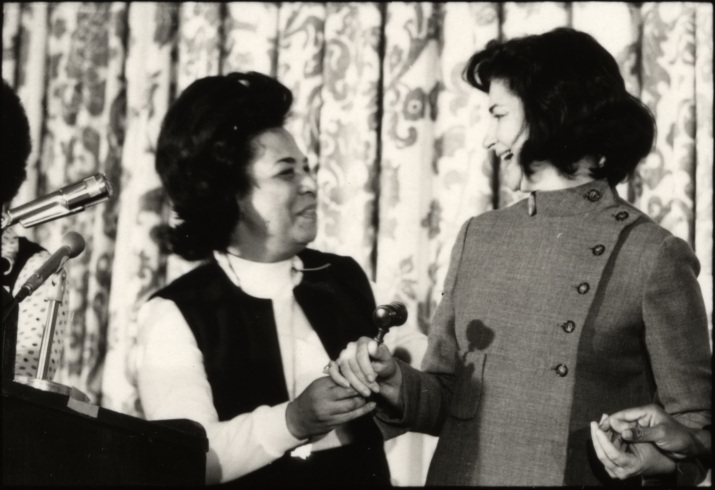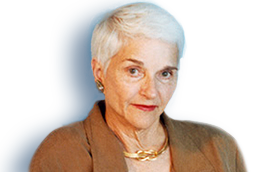National Women’s Political Caucus

After Congress failed to pass the federal Equal Rights Amendment in 1970, the founding members of the National Women’s Political Caucus concluded that equality would come only with women’s representation in political office. At the time, women represented just 1 percent of elected officials nationwide.
Three hundred and twenty women from 26 states met in Washington, D.C., on July 10-11, 1971, to launch the Caucus. Participants came from diverse racial, political and economic backgrounds. There were Republicans and Democrats, activists and political appointees. And there were famous women, too, including Gloria Steinem, Bella Abzug, Betty Friedan, and Myrlie B. Evers, wife of slain Mississippi civil rights leader Medgar Evers.
Sissy Farenthold, who was a member of the Texas Legislature at the time, read about the creation of the Caucus in the Corpus Christi newspaper. “I knew nothing about it,” she said, “except that I was elated to read it because I thought, ‘Now there will be some place to go to; there will be someone to talk to.”
In February 1973, less than a year after her vice-presidential nomination, Farenthold was elected the first chair of the National Women’s Political Caucus at the group’s biennial convention in Houston. She had been urged on by Steinem and others, and had accepted the two-year term as chair, despite the misgivings of her supporters in Texas, who were worried that her affiliation with the Caucus would alienate her from conservative voters and compromise her chances in future state elections.
The Houston gathering was the first women’s political convention since Seneca Falls in 1848.
Kaye Northcott, editor of The Texas Observer at the time, wrote that the Houston and Seneca Falls conventions had much in common. “If a delegation from the first movement had been time-warped to the National Women’s Political Caucus in Houston,” Northcott wrote, “the lady abolitionists would have been quite familiar with the issues under discussion.”1
More than 1,500 women attended the Houston convention on Feb. 8-11, 1973. There were multiple group meetings within the Caucus during the three-day convention. Union women met, Puerto Rican women met, Mexican American women met, African American women met. Differences surfaced in the course of the conference as various groups, from the Republicans to minorities, fought to ensure that they had board representation and champions for their issues.
For example, the Republican women, Northcott observed, failed to be recognized as a minority caucus within the NWPC. The convention agreed, however, that no more than 50 percent of the members of the Caucus’s National Policy Council would come from one political party. The convention ran out of time before it could pass resolutions.
The debates at the convention, and later during Farenthold’s tenure, spoke to the challenges of creating what 1972 presidential candidate Shirley Chisholm called “a big umbrella organization” for women. As the organization’s first chair, Farenthold had to create a self-sustaining organization, while also pursuing the Caucus’s key goals: passage of the ERA and the election of female candidates.
Before Farenthold became the chair, the Caucus rotated its leadership every six months. Members didn’t want to duplicate what they considered hierarchical and patriarchal organizational models, Farenthold said. “Well, after two years they found that really untenable,” she said. “They needed more structure than that, and that’s how my two-year term came about.”
As a new organization, the Caucus needed to make the transition from an informal network of grass-roots activists to a national, dues-paying, membership-based structure. In 1974, Farenthold wrote in a memo prior to a national steering committee meeting: “I have been your chairwoman for more than a year and a half – if the Caucus has consistently had any one flaw, it is the inability to plan and adequately serve those women in organizations who most need it. … It seems that it is time that women began facing up to the political realities of American life. It is necessary to have money to function.”
The Caucus professionalized its structure and became a political force under Farenthold. Male candidates for office sought the group’s support, and the Caucus succeeded in getting more women in elective and appointive offices. A brochure for the Caucus produced during Farenthold’s tenure cited several achievements: passage of the ERA in 30 states, five new women elected to Congress, and 28 percent more women elected to state legislatures in 1972.
During her time with the NWPC, Farenthold fiercely defended the reproductive rights of women. In the 1980s, she also served on the national advisory committee of the National Abortion Rights Action League (NARAL) as well as the advisory board of the Texas Abortion Rights Action League (TARAL).
In a letter to a constituent dated June 13, 1972, Farenthold explained her support for reproductive choice: “I am a Catholic. I am a practicing Catholic. Although I am personally opposed to abortion, I feel my religious beliefs should not dictate my civil duties. Thus my position on abortion, until a solution can be obtained balancing the rights of all involved, is that abortion should be a private matter without interference from the state.”
On September 10, 1977, at the biennial conference of the National Women’s Political Caucus, Farenthold criticized the government for failing to support public financing of abortion. “The right to abortion has become a class issue, a race issue, a privacy issue, and even a consumer issue,” she said. “But it is, above all, our issue.”
Despite the groundbreaking work of the Caucus and her role as chair, several years later Farenthold lamented that the fight for women’s rights and women’s equality was “the longest revolution.”



